Resume
Biomedical Engineer Cover Letter Examples

May 29, 2025
|
12 min read
Engineers, discover the secrets to crafting a standout biomedical engineer cover letter. Showcase your skills and experience to connect the dots and pump life into your application, landing you that interview. Dive into this comprehensive guide!
4.70 Average rating
Rated by 348 people
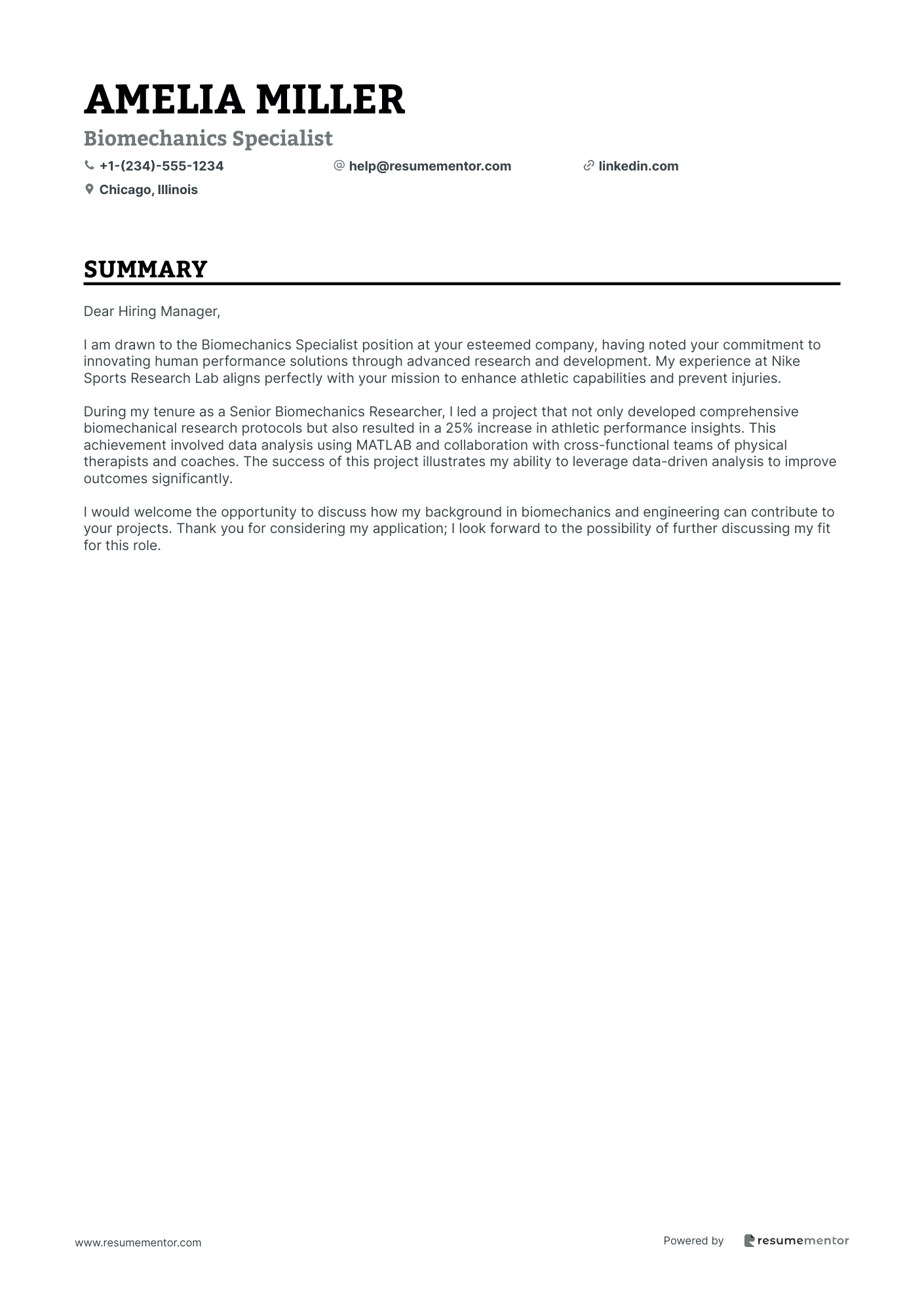
Biomechanics Specialist
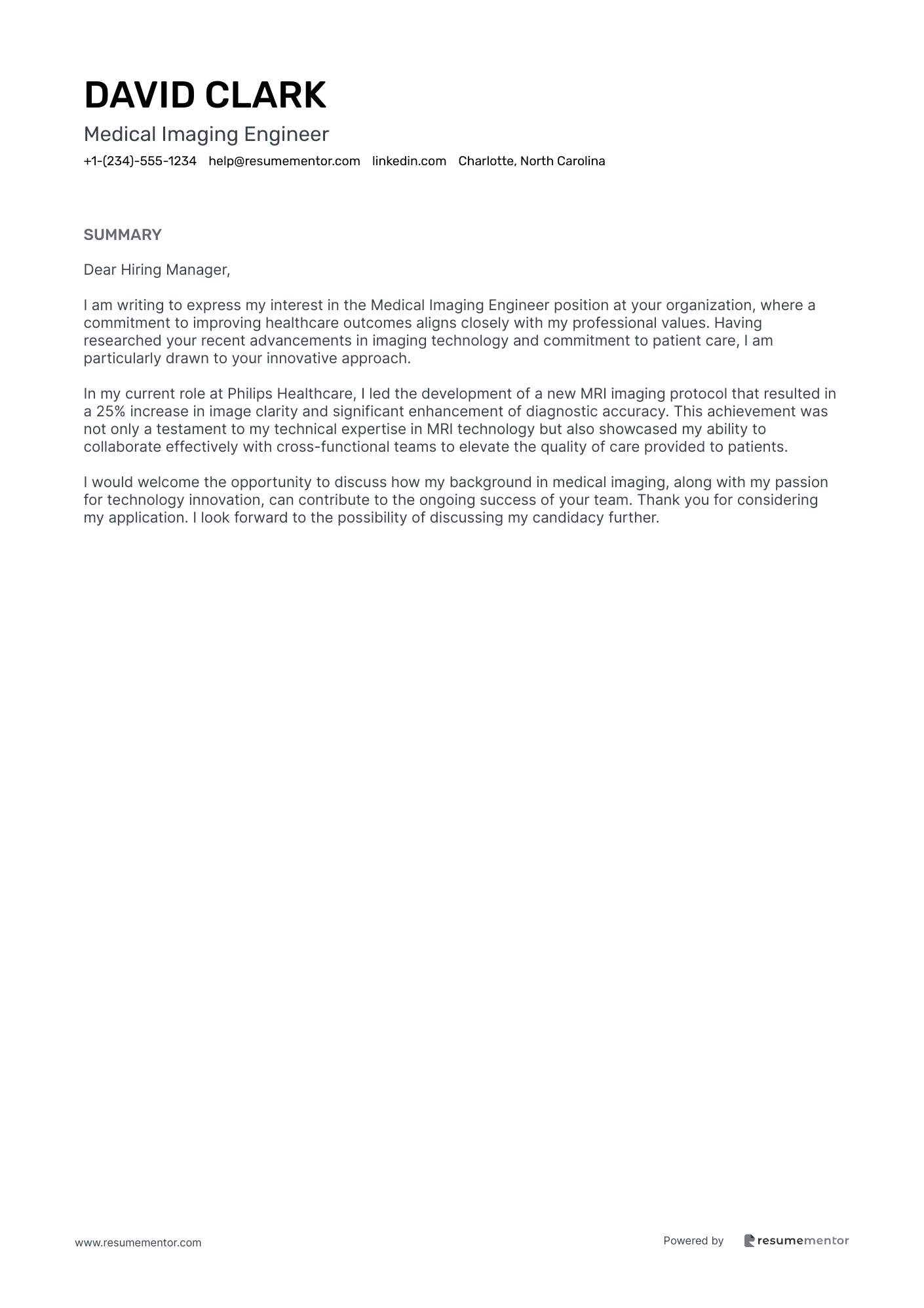
Medical Imaging Engineer
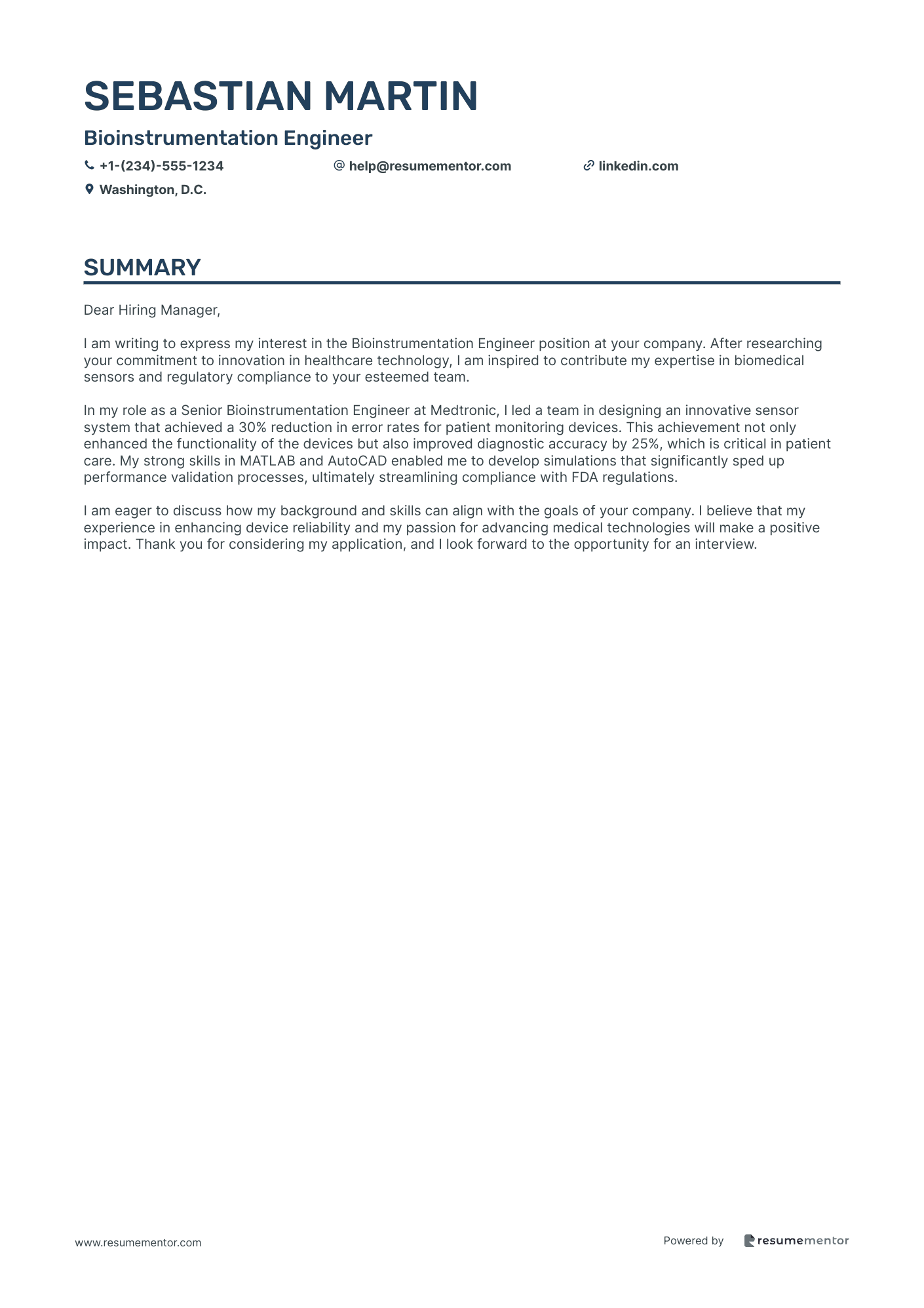
Bioinstrumentation Engineer
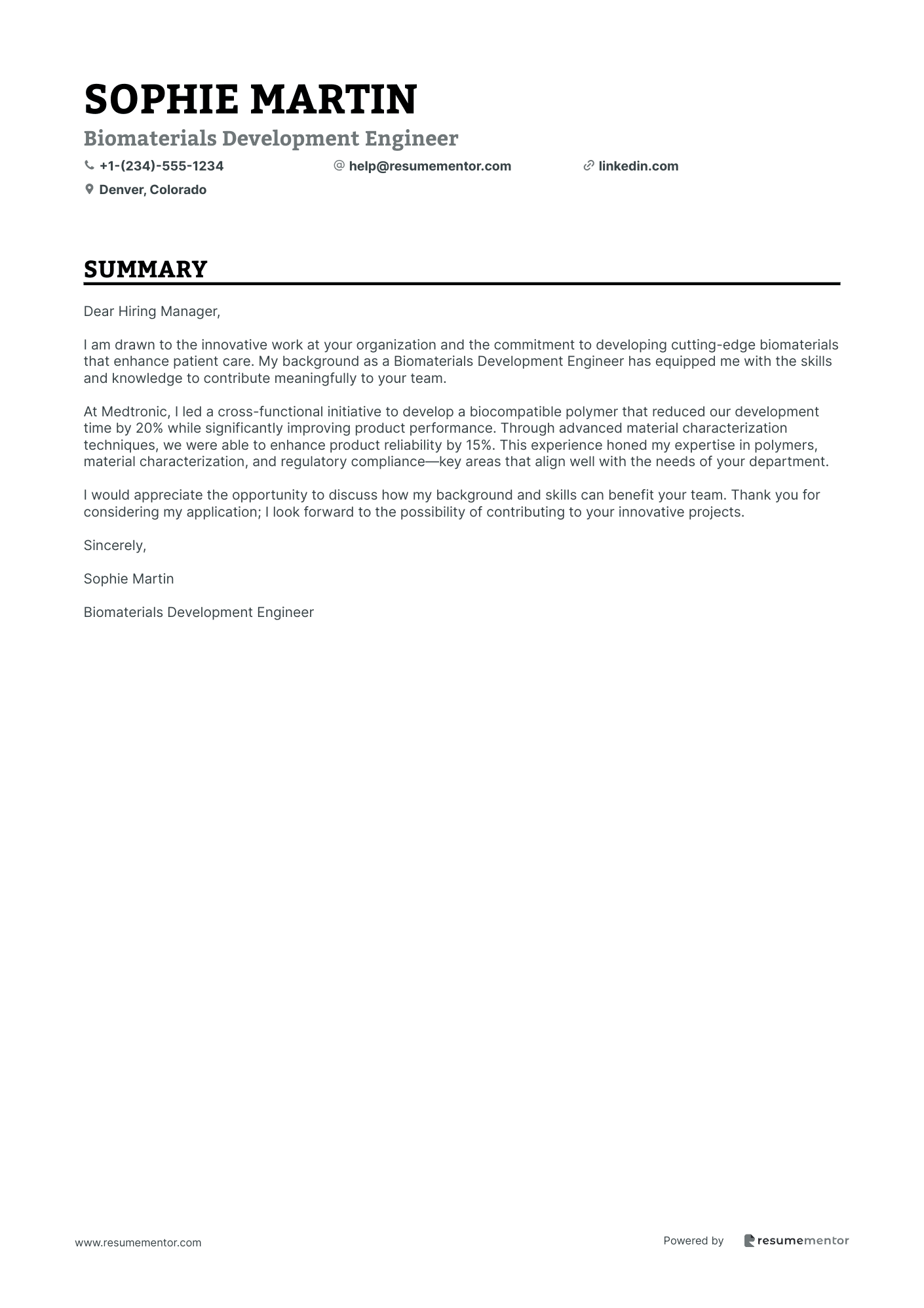
Biomaterials Development Engineer
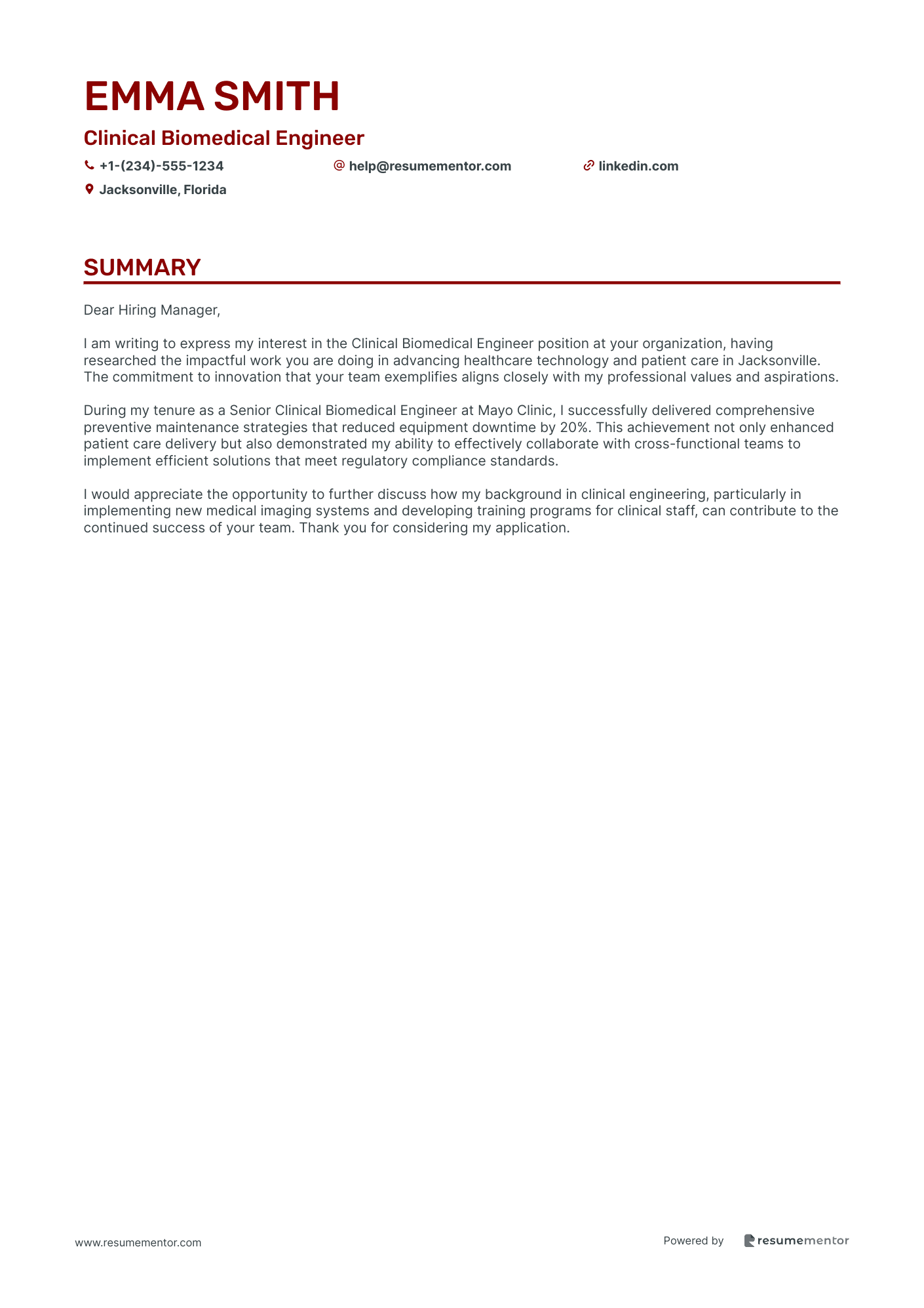
Clinical Biomedical Engineer
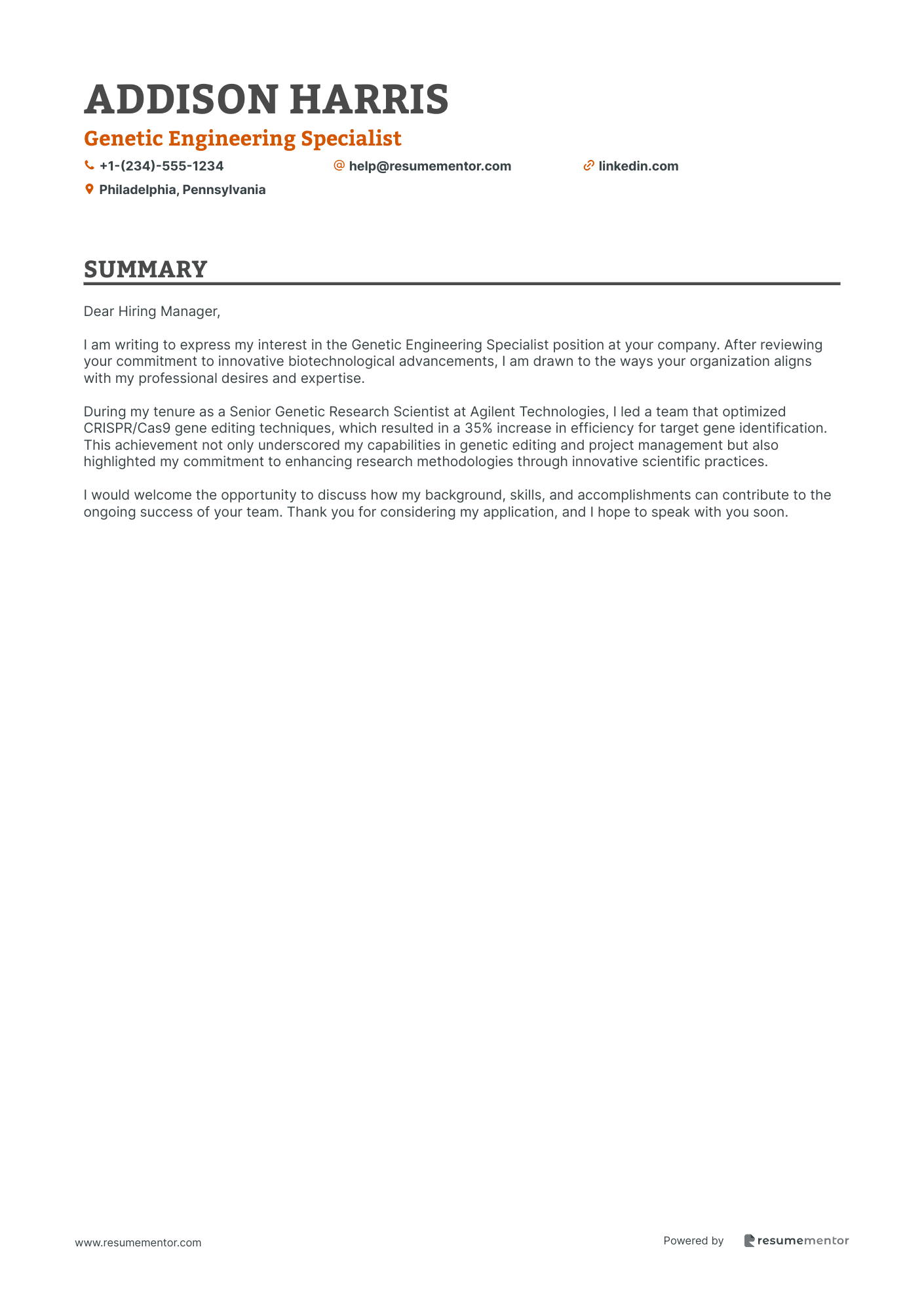
Genetic Engineering Specialist
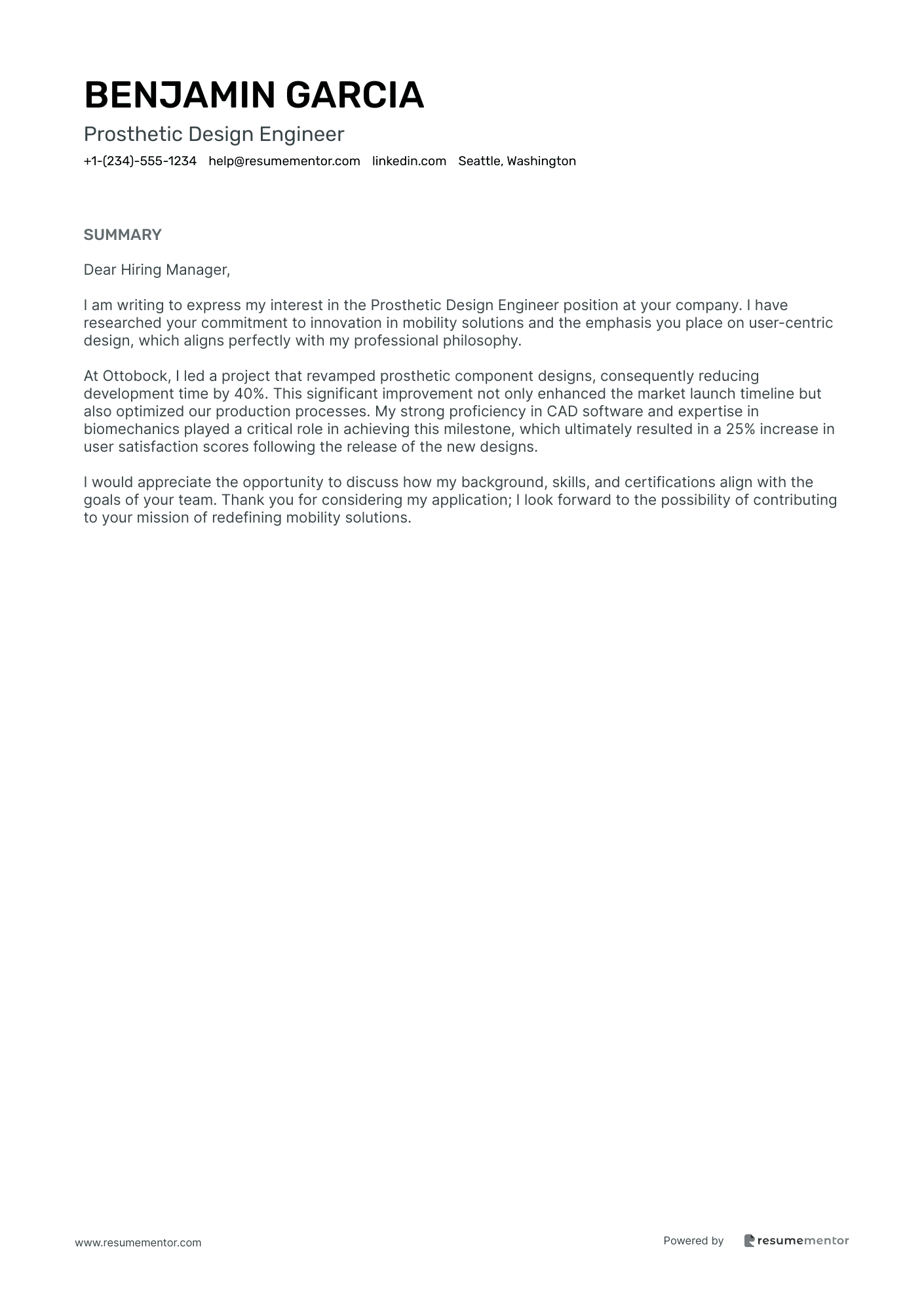
Prosthetic Design Engineer
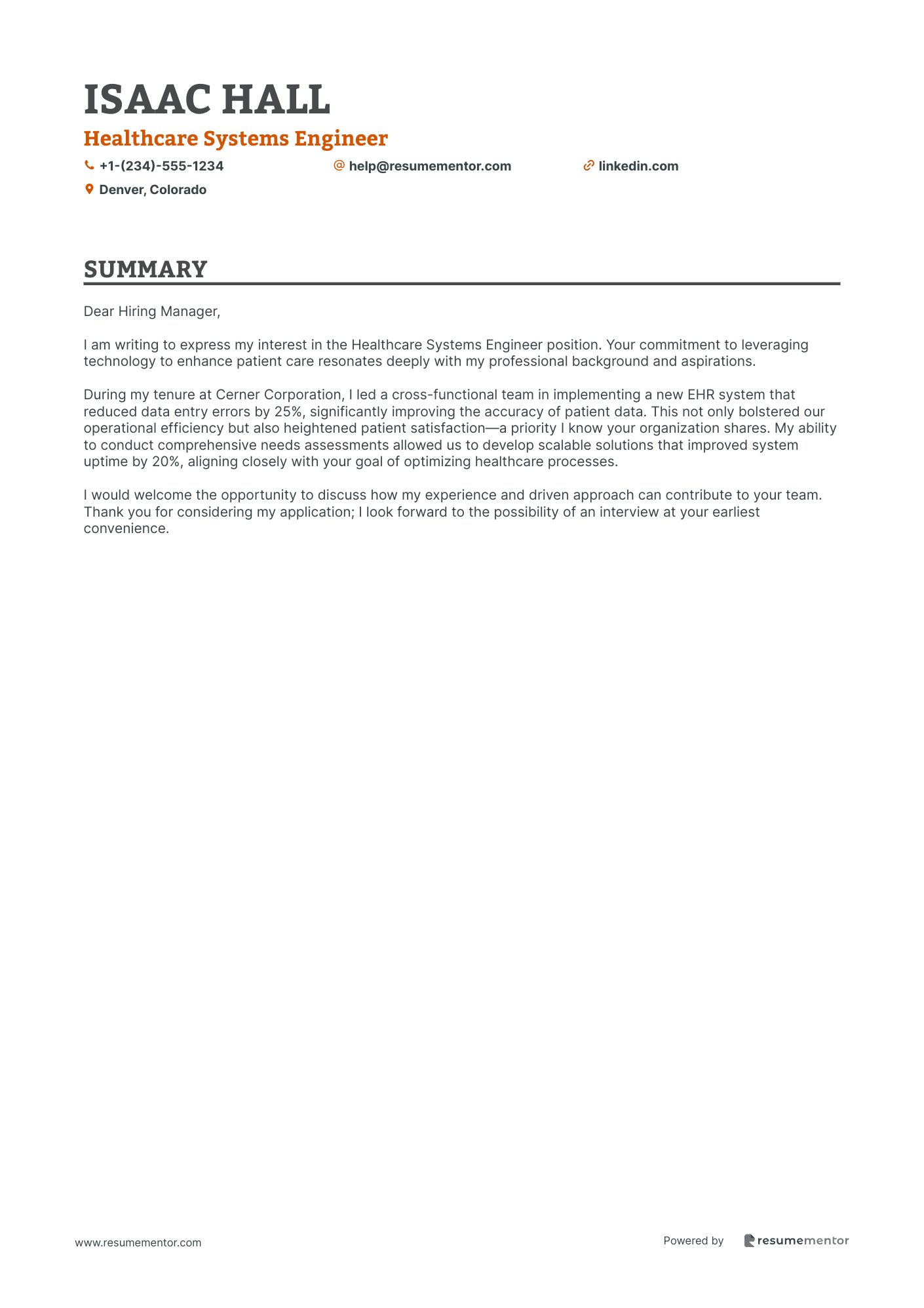
Healthcare Systems Engineer
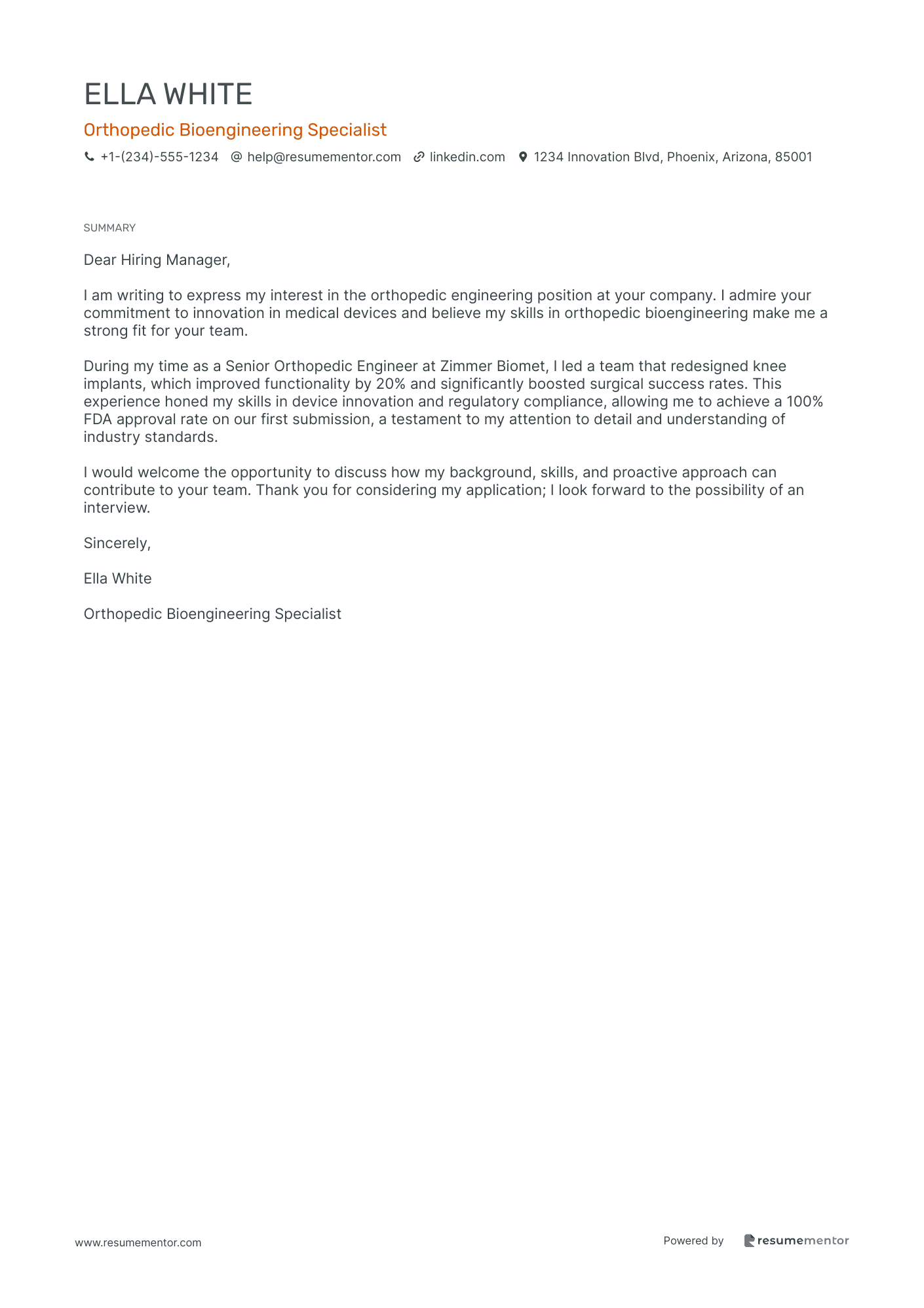
Orthopedic Bioengineering Specialist
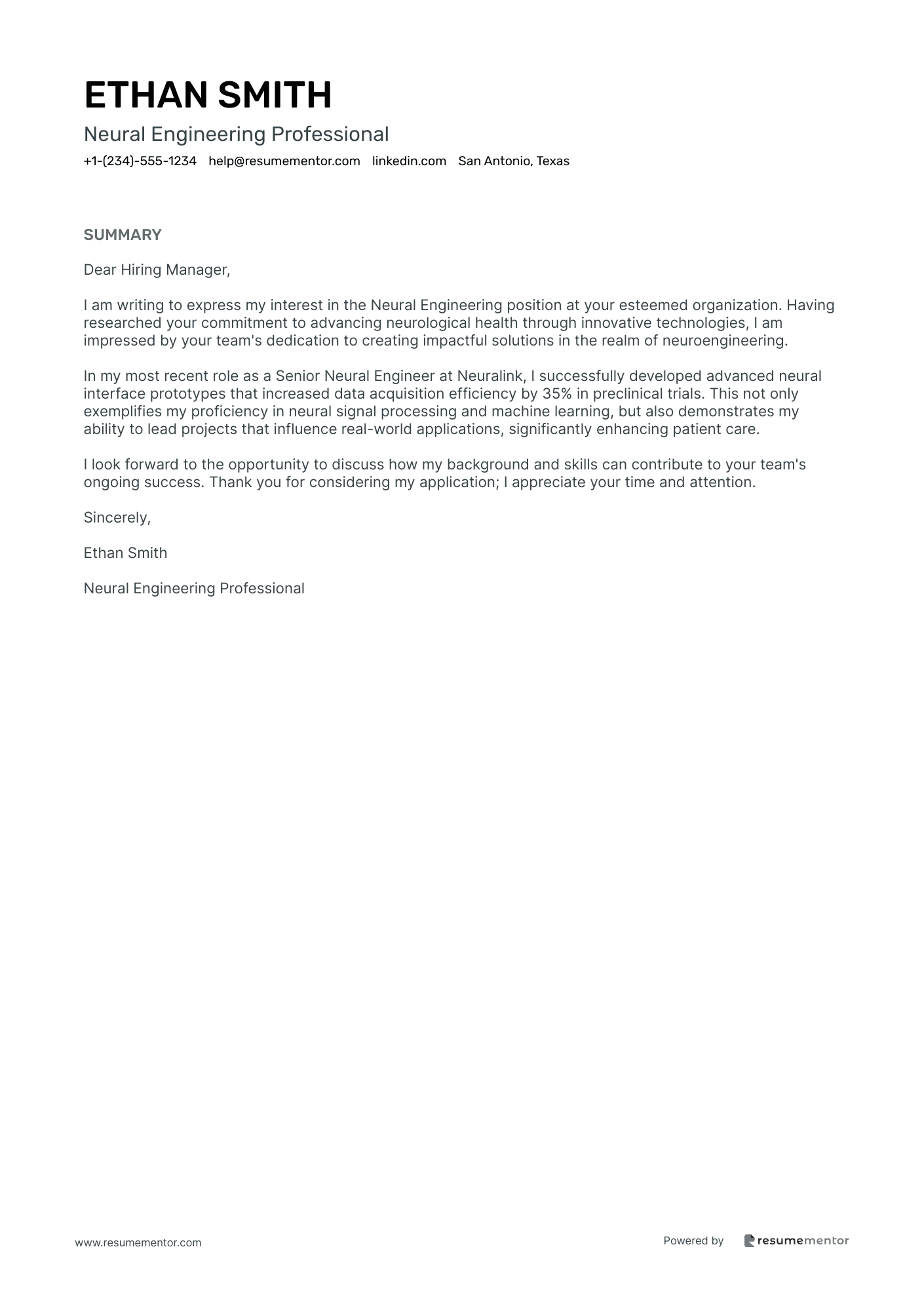
Neural Engineering Professional

Biomechanics Specialist cover letter sample
When applying for this position, it's essential to highlight any hands-on experience with motion analysis technology or orthopedic assessments. Showcase your understanding of human anatomy and biomechanics principles. If you have knowledge of software like MATLAB or OpenSim, be sure to mention it, as these skills enhance your analytical capabilities. Include examples of how your work has improved patient outcomes or influenced rehabilitation protocols. Using a 'skill-action-result' framework will help demonstrate your impact on previous projects or teams.
Amelia Miller
Biomechanics Specialist
Summary
Dear Hiring Manager,
I am drawn to the Biomechanics Specialist position at your esteemed company, having noted your commitment to innovating human performance solutions through advanced research and development. My experience at Nike Sports Research Lab aligns perfectly with your mission to enhance athletic capabilities and prevent injuries.
During my tenure as a Senior Biomechanics Researcher, I led a project that not only developed comprehensive biomechanical research protocols but also resulted in a 25% increase in athletic performance insights. This achievement involved data analysis using MATLAB and collaboration with cross-functional teams of physical therapists and coaches. The success of this project illustrates my ability to leverage data-driven analysis to improve outcomes significantly.
I would welcome the opportunity to discuss how my background in biomechanics and engineering can contribute to your projects. Thank you for considering my application; I look forward to the possibility of further discussing my fit for this role.
Medical Imaging Engineer cover letter sample
When crafting your cover letter, emphasize your technical expertise with imaging systems such as MRI or CT. Include any certifications like 'Certified Radiological Technologist' or specialized training in equipment maintenance. It's important to show your problem-solving abilities, particularly in troubleshooting and improving imaging processes. Also, provide specific examples of how your work enhanced image quality or reduced downtime, using a 'skill-action-result' format. Highlighting your team collaboration and communication skills can also set you apart, showcasing your ability to work well with healthcare professionals.
David Clark
Medical Imaging Engineer
Summary
Dear Hiring Manager,
I am writing to express my interest in the Medical Imaging Engineer position at your organization, where a commitment to improving healthcare outcomes aligns closely with my professional values. Having researched your recent advancements in imaging technology and commitment to patient care, I am particularly drawn to your innovative approach.
In my current role at Philips Healthcare, I led the development of a new MRI imaging protocol that resulted in a 25% increase in image clarity and significant enhancement of diagnostic accuracy. This achievement was not only a testament to my technical expertise in MRI technology but also showcased my ability to collaborate effectively with cross-functional teams to elevate the quality of care provided to patients.
I would welcome the opportunity to discuss how my background in medical imaging, along with my passion for technology innovation, can contribute to the ongoing success of your team. Thank you for considering my application. I look forward to the possibility of discussing my candidacy further.
Bioinstrumentation Engineer cover letter sample
When applying for this role, emphasize your technical skills in areas like sensor design, signal processing, and data analysis. Showcase your experience with biomedical devices and relevant software, such as MATLAB or LabVIEW. Highlight any projects where you improved device performance or contributed to innovative solutions. Certifications in biomedical engineering or related fields can strengthen your application. Use specific metrics to demonstrate your impact, such as efficiency improvements or successful project deliveries, to illustrate your ability to drive results in previous positions.
Sebastian Martin
Bioinstrumentation Engineer
Summary
Dear Hiring Manager,
I am writing to express my interest in the Bioinstrumentation Engineer position at your company. After researching your commitment to innovation in healthcare technology, I am inspired to contribute my expertise in biomedical sensors and regulatory compliance to your esteemed team.
In my role as a Senior Bioinstrumentation Engineer at Medtronic, I led a team in designing an innovative sensor system that achieved a 30% reduction in error rates for patient monitoring devices. This achievement not only enhanced the functionality of the devices but also improved diagnostic accuracy by 25%, which is critical in patient care. My strong skills in MATLAB and AutoCAD enabled me to develop simulations that significantly sped up performance validation processes, ultimately streamlining compliance with FDA regulations.
I am eager to discuss how my background and skills can align with the goals of your company. I believe that my experience in enhancing device reliability and my passion for advancing medical technologies will make a positive impact. Thank you for considering my application, and I look forward to the opportunity for an interview.
Biomaterials Development Engineer cover letter sample
When preparing your cover letter, it's essential to showcase your experience with materials science, particularly any work with polymers or composites. Highlight any projects where you developed new biomaterials or improved existing ones. Mention specific techniques you are proficient in, such as 3D printing or polymer characterization. Also, emphasize your collaboration skills and how you've worked with cross-functional teams. Provide concrete examples of how your innovations led to performance improvements or cost reductions in past roles, using the 'skill-action-result' framework to illustrate your impact.
Sophie Martin
Biomaterials Development Engineer
Summary
Dear Hiring Manager,
I am drawn to the innovative work at your organization and the commitment to developing cutting-edge biomaterials that enhance patient care. My background as a Biomaterials Development Engineer has equipped me with the skills and knowledge to contribute meaningfully to your team.
At Medtronic, I led a cross-functional initiative to develop a biocompatible polymer that reduced our development time by 20% while significantly improving product performance. Through advanced material characterization techniques, we were able to enhance product reliability by 15%. This experience honed my expertise in polymers, material characterization, and regulatory compliance—key areas that align well with the needs of your department.
I would appreciate the opportunity to discuss how my background and skills can benefit your team. Thank you for considering my application; I look forward to the possibility of contributing to your innovative projects.
Sincerely,
Sophie Martin
Biomaterials Development Engineer
Clinical Biomedical Engineer cover letter sample
When applying for this position, highlight any experience you have with medical devices and technology. Be sure to showcase your technical skills, especially in maintenance and troubleshooting of equipment. Mention any relevant coursework or certifications, such as in biomedical engineering or medical device regulations. Include examples of projects where you improved equipment performance or enhanced patient care, using a 'skill-action-result' framework. Point out your ability to work in teams and communicate effectively with healthcare professionals to demonstrate your collaborative skills.
Emma Smith
Clinical Biomedical Engineer
Summary
Dear Hiring Manager,
I am writing to express my interest in the Clinical Biomedical Engineer position at your organization, having researched the impactful work you are doing in advancing healthcare technology and patient care in Jacksonville. The commitment to innovation that your team exemplifies aligns closely with my professional values and aspirations.
During my tenure as a Senior Clinical Biomedical Engineer at Mayo Clinic, I successfully delivered comprehensive preventive maintenance strategies that reduced equipment downtime by 20%. This achievement not only enhanced patient care delivery but also demonstrated my ability to effectively collaborate with cross-functional teams to implement efficient solutions that meet regulatory compliance standards.
I would appreciate the opportunity to further discuss how my background in clinical engineering, particularly in implementing new medical imaging systems and developing training programs for clinical staff, can contribute to the continued success of your team. Thank you for considering my application.
Genetic Engineering Specialist cover letter sample
When applying for this position, it’s important to showcase your experience with molecular biology techniques and CRISPR technology. Highlight any research projects or internships where you contributed to genetic modifications or analyses. If you possess certifications in bioinformatics or biostatistics, mention these as they demonstrate your analytical skills. Use specific examples of how your work has led to successful outcomes, such as improved crop yields or disease resistance in organisms. Employ a 'skill-action-result' framework to clearly illustrate your contributions.
Addison Harris
Genetic Engineering Specialist
Summary
Dear Hiring Manager,
I am writing to express my interest in the Genetic Engineering Specialist position at your company. After reviewing your commitment to innovative biotechnological advancements, I am drawn to the ways your organization aligns with my professional desires and expertise.
During my tenure as a Senior Genetic Research Scientist at Agilent Technologies, I led a team that optimized CRISPR/Cas9 gene editing techniques, which resulted in a 35% increase in efficiency for target gene identification. This achievement not only underscored my capabilities in genetic editing and project management but also highlighted my commitment to enhancing research methodologies through innovative scientific practices.
I would welcome the opportunity to discuss how my background, skills, and accomplishments can contribute to the ongoing success of your team. Thank you for considering my application, and I hope to speak with you soon.
Prosthetic Design Engineer cover letter sample
When applying for this role, it's important to showcase your hands-on experience with CAD software and 3D printing technologies. Highlight any previous projects where you designed or improved prosthetic devices, focusing on user-centered design principles. Share certifications or workshops you've completed related to biomedical engineering or materials science. Use specific examples that demonstrate your problem-solving skills and how your designs increased functionality or user comfort. Show how your collaborative work with healthcare professionals led to successful outcomes, emphasizing a 'challenge-solution-impact' narrative.
Benjamin Garcia
Prosthetic Design Engineer
Summary
Dear Hiring Manager,
I am writing to express my interest in the Prosthetic Design Engineer position at your company. I have researched your commitment to innovation in mobility solutions and the emphasis you place on user-centric design, which aligns perfectly with my professional philosophy.
At Ottobock, I led a project that revamped prosthetic component designs, consequently reducing development time by 40%. This significant improvement not only enhanced the market launch timeline but also optimized our production processes. My strong proficiency in CAD software and expertise in biomechanics played a critical role in achieving this milestone, which ultimately resulted in a 25% increase in user satisfaction scores following the release of the new designs.
I would appreciate the opportunity to discuss how my background, skills, and certifications align with the goals of your team. Thank you for considering my application; I look forward to the possibility of contributing to your mission of redefining mobility solutions.
Healthcare Systems Engineer cover letter sample
When crafting your cover letter, focus on your experience with healthcare systems and technology integration. Highlight any projects where you optimized processes or improved patient outcomes through innovative solutions. If you have expertise in data analysis or software development relevant to healthcare applications, include that too. Certs or training in healthcare informatics or systems management can set you apart. Use specific examples to illustrate your technical skills and their direct impact, ensuring you follow a clear 'situation-task-action-result' format.
Isaac Hall
Healthcare Systems Engineer
Summary
Dear Hiring Manager,
I am writing to express my interest in the Healthcare Systems Engineer position. Your commitment to leveraging technology to enhance patient care resonates deeply with my professional background and aspirations.
During my tenure at Cerner Corporation, I led a cross-functional team in implementing a new EHR system that reduced data entry errors by 25%, significantly improving the accuracy of patient data. This not only bolstered our operational efficiency but also heightened patient satisfaction—a priority I know your organization shares. My ability to conduct comprehensive needs assessments allowed us to develop scalable solutions that improved system uptime by 20%, aligning closely with your goal of optimizing healthcare processes.
I would welcome the opportunity to discuss how my experience and driven approach can contribute to your team. Thank you for considering my application; I look forward to the possibility of an interview at your earliest convenience.
Orthopedic Bioengineering Specialist cover letter sample
When applying for this position, it's important to emphasize your technical skills in biomechanics and materials science. Highlight any relevant experience in developing or testing orthopedic devices. Mention any internships or projects that showcase your skills, and detail the outcomes of your work. Certifications in areas like quality assurance or regulatory affairs can strengthen your application. Use specific examples that demonstrate your problem-solving abilities and how your contributions have led to improved patient outcomes or product efficiency. Focus on measurable achievements to stand out.
Ella White
Orthopedic Bioengineering Specialist
Summary
Dear Hiring Manager,
I am writing to express my interest in the orthopedic engineering position at your company. I admire your commitment to innovation in medical devices and believe my skills in orthopedic bioengineering make me a strong fit for your team.
During my time as a Senior Orthopedic Engineer at Zimmer Biomet, I led a team that redesigned knee implants, which improved functionality by 20% and significantly boosted surgical success rates. This experience honed my skills in device innovation and regulatory compliance, allowing me to achieve a 100% FDA approval rate on our first submission, a testament to my attention to detail and understanding of industry standards.
I would welcome the opportunity to discuss how my background, skills, and proactive approach can contribute to your team. Thank you for considering my application; I look forward to the possibility of an interview.
Sincerely,
Ella White
Orthopedic Bioengineering Specialist
Neural Engineering Professional cover letter sample
Highlight any academic background in biomedical engineering, neuroscience, or a related field. Experience with neural interfaces or brain-computer interfaces is highly relevant. Emphasize your skills in data analysis and programming languages such as MATLAB or Python, which are critical in this field. Include any projects or research work that demonstrates your ability to solve complex problems using innovation. Use specific examples showing how your technical skills have led to successful outcomes, such as improved neural signal processing or enhanced device usability.
Ethan Smith
Neural Engineering Professional
Summary
Dear Hiring Manager,
I am writing to express my interest in the Neural Engineering position at your esteemed organization. Having researched your commitment to advancing neurological health through innovative technologies, I am impressed by your team's dedication to creating impactful solutions in the realm of neuroengineering.
In my most recent role as a Senior Neural Engineer at Neuralink, I successfully developed advanced neural interface prototypes that increased data acquisition efficiency by 35% in preclinical trials. This not only exemplifies my proficiency in neural signal processing and machine learning, but also demonstrates my ability to lead projects that influence real-world applications, significantly enhancing patient care.
I look forward to the opportunity to discuss how my background and skills can contribute to your team's ongoing success. Thank you for considering my application; I appreciate your time and attention.
Sincerely,
Ethan Smith
Neural Engineering Professional
Related Articles

Continue Reading
Check more recommended readings to get the job of your dreams.
Resume
Resources
Tools
© 2026. All rights reserved.
Made with love by people who care.
